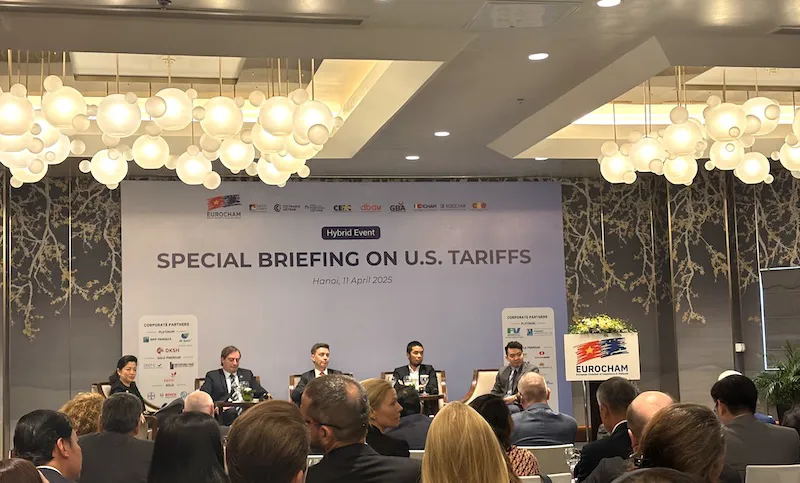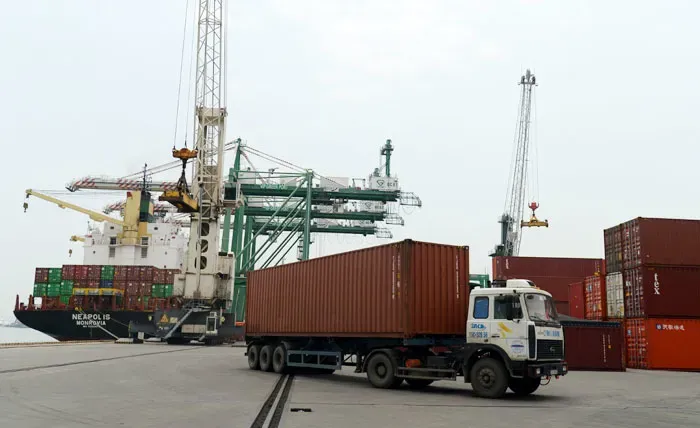EU, Vietnam eye opportunity in US tariff shift, urge reforms to boost resilience
Newly imposed tariffs from Washington are sparking concerns among European businesses in Vietnam and Vietnamese policymakers alike, even as both sides adapt to an increasingly uncertain global trade environment, said local insiders.
THE HANOI TIMES — In the face of rising US tariffs, Vietnam and the European Union are cautiously optimistic, viewing the current trade turbulence as an opportunity to strengthen long-term resilience and cooperation.
Speaking at a special briefing on US tariffs in Hanoi on April 11, Bruno Jaspaert, Chairman of the European Chamber of Commerce in Vietnam (EuroCham Vietnam), reaffirmed European businesses' long-term commitment to Vietnam, calling it "our home" and urging policymakers to seize the moment to upgrade infrastructure, cut red tape, and increase local value-added in manufacturing.
He believed these efforts could help transform the next two years from challenging to pivotal for Vietnam in the global economic landscape.
Both EU and Vietnamese experts attending the seminar agreed that the 90-day grace period represents a critical window for companies to reassess their operations, recalibrate market strategies, and optimize supply chains in response to changing trade dynamics.
EU-Vietnam trade bonds strengthen through turmoil

Representatives from EuroCham Vietnam, PwC, and BakerHostetler discuss US tariffs at a special briefing on April 11. Photo: Phi Nhat/The Hanoi Times
According to Jaspaert, a rapid-response survey conducted among EuroCham members revealed significant concerns. If Vietnam faces higher tariffs than its regional neighbors, businesses estimate that they could lose up to 20% of their revenues. Half of the companies surveyed admitted that their operations could be seriously threatened if the situation deteriorated further.
Despite the risks, no company has plans to pull out of Vietnam. "A business is not like a car that can make a quick turn. It is more like a big ship. It takes time to change direction," Jaspaert said. "Most companies are taking a wait-and-see approach, using the 90-day window to reassess costs, supply chains, and competitiveness in the US market."
European companies in Vietnam remain cautiously optimistic, with 25% of them seeing "opportunity in crisis." If Vietnam plays its strategic cards right, it could become an alternative destination in the restructured global supply chain as trade flows shift to avoid tariff barriers.
“No one can reshape global supply chains unilaterally. That requires an economically solid foundation. Vietnam has the potential to build that,” Jaspaert said.
Looking ahead to the next two years, experts at the seminar agreed that Vietnam must seize the opportunity to strengthen its internal capacity and reduce its reliance on the US market.
With the US accounting for about 13% of global trade, the remaining 87% represents a vast arena for Vietnam to tap into. "We cannot allow one country to unilaterally rewrite the rules of global trade. The world must remain committed to multilateral principles," Jaspaert added.
He also warned against overdependence on the US market, especially when US companies survive only through the artificial advantages of protectionist tariffs.
European companies investing in Vietnam are primarily serving the domestic market, the Asia-Pacific region, and Europe. This reflects Vietnam’s growing appeal as a strategic manufacturing and consumption hub, particularly as global trade flows shift, the EuroCham chairman said.
However, the supply chain remains critically weak. Julien Guerrier, Ambassador and Head of the EU Delegation to Vietnam, noted that Vietnam's biggest vulnerability is its dependence on raw materials from China. This makes Vietnamese exports susceptible to collateral damage from US tariff policies.
He said that the best scenario for Vietnam would be to increase the local content in its products or ensure clear Vietnamese origin rather than relying heavily on Chinese inputs. “If Vietnam can achieve 80% to 100% localization in export products, it would be a game changer,” he said.
Experts from PwC and EuroCham Vietnam agreed that the period from 2025 to 2027 could be challenging for foreign direct investment (FDI). At a time of global uncertainty, many investors are likely to delay large-scale projects rather than commit new capital.
Jaspaert revealed that, of the 24 investment projects Deep C Industrial Zones is overseeing this year, only one has been delayed so far. However, this delay alone affects $1.8 billion in potential economic contribution. "The next three months will be crucial. If Vietnam is penalized more than its neighbors, FDI will certainly decline," he warned.
Tung Nguyen, Senior Associate at BakerHostetler, also predicted delays in large electronics manufacturing projects from South Korea and other countries. “Vietnam has time to rebuild infrastructure and prepare for the next wave of FDI,” he said.
Despite cautious forecasts, speakers expressed confidence in Vietnam's ability to adapt quickly. From its position as the "new factory of the world" to its push for digital transformation and infrastructure development, Vietnam has many strengths that can support continued growth.
EU backs Vietnam amid tariffs
Reacting to the US tariff policy, Ambassador Julien Guerrier expressed regret over Washington’s decision to impose new tariffs, including a 25% rate on cars and steel from Europe. He said that it could hurt businesses, fuel inflation, and disrupt global supply chains, especially for small- and medium-sized enterprises.
Guerrier reiterated the EU's commitment to supporting Vietnam not only in trade but also in areas such as renewable energy, infrastructure, administrative reform, and legal digitization. "This is a golden opportunity for Europe to deepen its partnership with the East. We are not looking for short-term deals, but long-term partnerships based on mutual respect and shared risks," he said.
He emphasized Vietnam's resilience and adaptability. With the right strategies, the country could sustain growth and potentially achieve an 8% GDP expansion. "Vietnam has overcome greater challenges in the past and emerged stronger," he said.

A corner of the Haiphong Port. Photo: Pham Hung












